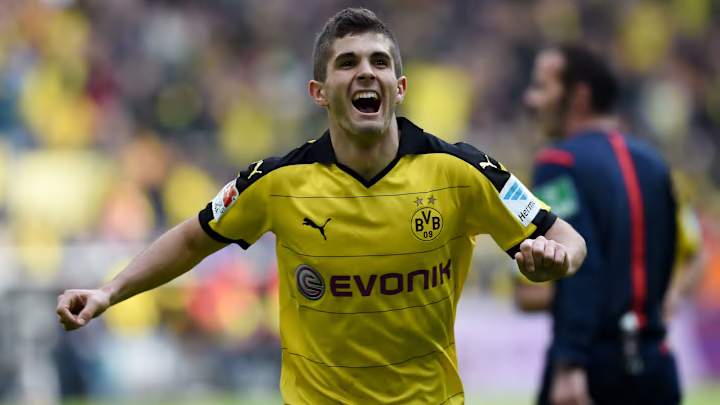These aren’t merely debuts. They are moments of arrival, matches where raw potential became lasting legacy. Whether it’s Götze’s brilliance against Bayern under Klopp, Christian Pulisic’s fearless breakout during Tuchel’s tenure, or Youssoufa Moukoko’s youthful spark under Terzic, Dortmund’s defining performances often double as coming-of-age stories.
This review revisits those pivotal nights, fixtures that transformed prospects into pillars, and hope into history. Through these games, we trace how Dortmund’s faith in youth not only produces stars but sustains a footballing philosophy built on courage, identity, and constant renewal.
The Klopp Era: Mario Götze vs Hannover 96 (2010)
Jürgen Klopp’s Dortmund was built on intensity, identity, and instinct, and no player embodied that better than a young Mario Gotze. When Dortmund travelled to Hannover in late 2010, the team was still learning to believe in itself. What unfolded that night was not just a victory, but the birth of a phenomenon.
Götze orchestrated play with a maturity that defied his years. Operating as a drifting No. 10 in a Klopp 4-2-3-1, his touch, vision, and speed of thought elevated Dortmund’s attack from chaotic energy to creative harmony. He linked fluidly with Shinji Kagawa and Lucas Barrios, threading passes through tight gaps and gliding past defenders as if time slowed. His goal, a superb finish after slicing through Hannover’s defence, was more than a highlight; it was a declaration.

Klopp’s trust in youth wasn’t born from necessity, but conviction. He gave Götze freedom within structure, responsibility within chaos. By the end of the 4-0 win, it was clear Dortmund’s title challenge would be powered not just by gegenpressing, but by the fearlessness of youth.
That night marked the moment Götze transitioned from academy prospect to national treasure. Under Klopp, potential wasn’t protected; it was unleashed.
Thomas Tuchel Era: Christian Pulisic vs Hamburg (2016)
By 2016, Dortmund’s football had evolved from Klopp’s chaos into Tuchel’s precise, positional system. Yet in a carefully constructed framework, a fearless teenager could still shine. Christian Pulisic’s breakout against Hamburg wasn’t only a personal coming-of-age, but a reminder that youth could flourish even within tactical discipline.
At 17, Pulisic started in Tuchel’s 4-1-4-1 with Julian Weigl anchoring midfield. His movement was intelligent, his pressing coordinated, yet his flair remained unrestrained. His opening goal, a perfectly timed run and composed finish, exemplified Dortmund’s hybrid of structure and natural creativity. Darting runs and sharp interplay with Reus and Kagawa stretched Hamburg’s defence, forcing errors.
The match demonstrated how youth could integrate seamlessly into a meticulous system. Tuchel later described Pulisic as “unusually mature for his age”, a player who grasped rhythm and tempo instinctively. The 3-0 win symbolised a Dortmund still adventurous but now cerebral. For Pulisic, it was the day he ceased being a prospect and became a central figure bridging Klopp’s energy.
Edin Terzic Era: Youssoufa Moukoko vs Schalke (2020)
When Youssoufa Moukoko debuted against Schalke in November 2020, the world watched a 16-year-old enter one of football’s fiercest rivalries. Under Edin Terzic, Dortmund’s youth philosophy and attacking principles converged, giving raw talent space to thrive within a structured system.
Terzic deployed a fluid 4-2-3-1, blending defensively stability with rapid transitions. Moukoko’s pace and positional intelligence immediately stretched Schalke’s backline, creating space for Reus and Haaland. His composed debut goal showcased instinctive timing within Terzic’s tactical framework, while each touch highlighted his adaptability: pressing intelligently without hindering the attacking fluidity.

The 3-1 win epitomized Terzic’s philosophy: a club that honours its traditions while embracing youth. Moukoko’s performance bridged Dortmund’s historical commitment to developing talent with modern tactical demands, illustrating that the next generation could flourish under the proper guidance.
Across different eras, Dortmund’s commitment to youth remains unwavering. Klopp unleashed talent with freedom and responsibility, Tuchel integrated youngsters into a precise tactical framework, and Terzic balances emotion with structure to nurture the next generation. These matches reveal more than standout performances; they showcase a club’s philosophy in action.
By examining the games that launched the careers of tomorrow’s stars, we see not just only the players themselves, but also the culture that makes Dortmund a beacon for emerging footballing talent. At BVB, youth isn’t simply given a chance; it is trusted to shape the club’s identity, now and for the future.
